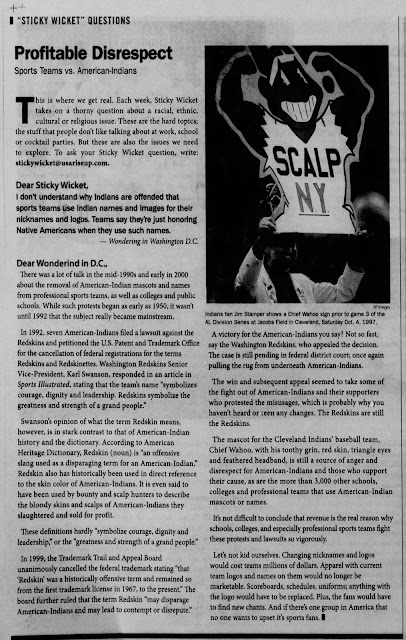2008 Redskin also has historically been used in direct reference to the skin color of American-Indians. It is even said to have been used by bounty and scalp hunters to describe the bloody skins and scalps of American-Indians they slaughtered and sold for profit.
Profitable Disrespect
2008 July 20 The Cincinnati Enquirer
Dear Sticky Wicket,
I don’t understand why Indians are offended that sports teams use Indian names and images for their nicknames and logos. Teams say they’re just honoring Native Americans when they use such names. --- Wondering in Washington DC
Dear Wondering in DC.,
There was a lot of talk in the mid-1990s and early 2000 about the removal of American-Indian mascots and names from professional sports teams, as well as colleges and public schools. While such protests began as early as 1950, it wasn’t until 1992 that the subject really became mainstream.
In 1992, seven American-Indians filed a lawsuit against the Redskins and petitioned the US Patent and Trademark Office for the cancellation of federal registrations for the teams Redskins and Redskinettes. Washington Redskins Senior Vice-President, Karl Swanson, responded in an article in Sports Illustrated, stating that the team’s name “symbolizes courage, dignity and leadership. Redskins symbolize the greatness and strength of a grand people.”
Swanson’s opinion of what the term Redskin means, however, is in stark contrast to that of American-Indian history and the dictionary. According to American Heritage Dictionary, Redskin (noun) is “an offensive slang used as a disparaging term for an American-Indian.” Redskin also has historically been used in direct reference to the skin color of American-Indians. It is even said to have been used by bounty and scalp hunters to describe the bloody skins and scalps of American-Indians they slaughtered and sold for profit.
These definitions hardly “symbolize courage, dignity and leadership,” or the “greatness and strength of a grand people.”
In 1999, the Trademark Trail and Appeal Board unanimously canceled the federal trademark stating “that ‘Redskin’ was a historically offensive term and remained so from the first trademark license in 1967, to the present.” The board further ruled that the term Redskin “may disparage American-Indians and may lead to contempt or disrepute.”
A victory for the American-Indians you say? Not so fast, say the Washington Redskins, who appealed the decision. The case is still pending in federal district court; once again pulling the rug from underneath American-Indians.
The win and subsequent appeal seemed to take some of the fight out of American-Indians and their supporters who protested the misusages, which is probably why you haven’t heard or seen any changes. The Redskins are still the Redskins.
The mascot for the Cleveland Indians’ baseball team, Chief Wahoo, with his toothy grin, red skin, triangle eyes and feathered headband, is still a source of anger and disrespect for American-Indians and those who support their cause, as are the more than 3000 other schools, colleges and professional teams that use American-Indian mascots or names.
It’s not difficult to conclude that revenue is the real reason why schools, colleges and especially professional sports teams fight these protests and lawsuits so vigorously.
Let’s not kid ourselves. Changing nicknames and logos would cost teams millions of dollars. Apparel with current team logos and names on them would no longer be marketable. Scoreboards, schedules, uniforms, anything with the logo would have to be replaced. Plus, the fans would have to find a new chant. And if there’s one group in America that no one wants to upset it’s a sports fan.
 |
| 2008 July 20 The Cincinnati Enquirer |



Comments
Post a Comment